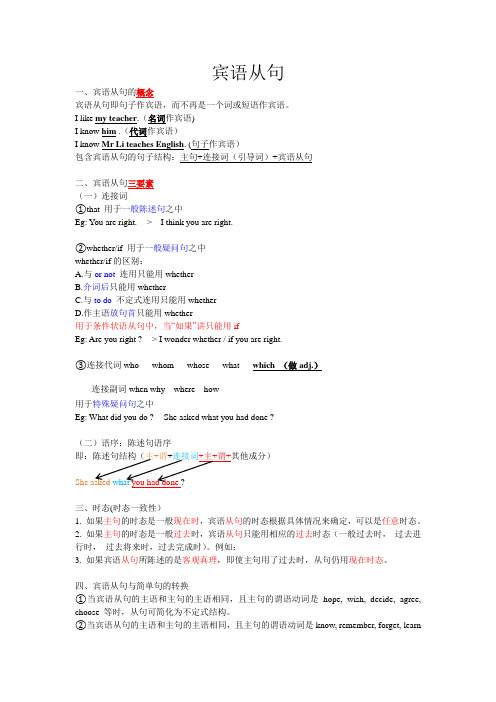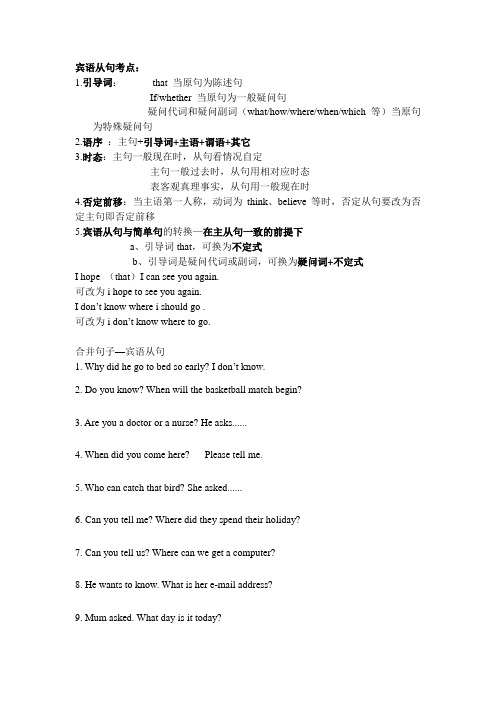宾语从句与简单句的转换
- 格式:pptx
- 大小:81.05 KB
- 文档页数:11

宾语从句一、宾语从句的概念宾语从句即句子作宾语,而不再是一个词或短语作宾语。
I like my teacher.(名词作宾语)I know him .(代词作宾语)I know Mr Li teaches English. (句子作宾语)包含宾语从句的句子结构:主句+连接词(引导词)+宾语从句二、宾语从句三要素(一)连接词①that 用于一般陈述句之中Eg: You are right. -- > I think you are right.②whether/if 用于一般疑问句之中whether/if的区别:A.与or not连用只能用whetherB.介词后只能用whetherC.与to do不定式连用只能用whetherD.作主语放句首只能用whether用于条件状语从句中,当“如果”讲只能用ifEg: Are you right ? -- > I wonder whether / if you are right.③连接代词who whom whose what which (做adj.)连接副词when why where how用于特殊疑问句之中Eg: What did you do ? -- She asked what you had done ?(二)语序:陈述句语序即:陈述句结构(主+谓+连接词+主+谓+其他成分)She asked what you had done ?三、时态(时态一致性)1. 如果主句的时态是一般现在时,宾语从句的时态根据具体情况来确定,可以是任意时态。
2. 如果主句的时态是一般过去时,宾语从句只能用相应的过去时态(一般过去时,过去进行时,过去将来时,过去完成时)。
例如:3. 如果宾语从句所陈述的是客观真理,即使主句用了过去时,从句仍用现在时态。
四、宾语从句与简单句的转换①当宾语从句的主语和主句的主语相同,且主句的谓语动词是hope, wish, decide, agree, choose 等时,从句可简化为不定式结构。

宾语从句考点:1.引导词:that 当原句为陈述句If/whether 当原句为一般疑问句疑问代词和疑问副词(what/how/where/when/which等)当原句为特殊疑问句2.语序:主句+引导词+主语+谓语+其它3.时态:主句一般现在时,从句看情况自定主句一般过去时,从句用相对应时态表客观真理事实,从句用一般现在时4.否定前移:当主语第一人称,动词为think、believe等时,否定从句要改为否定主句即否定前移5.宾语从句与简单句的转换—在主从句一致的前提下a、引导词that,可换为不定式b、引导词是疑问代词或副词,可换为疑问词+不定式I hope (that)I can see you again.可改为i hope to see you again.I don’t know where i should go .可改为i don’t know where to go.合并句子—宾语从句1. Why did he go to bed so early? I don’t know.2. Do you know? When will the basketball match begin?3. Are you a doctor or a nurse? He asks......4. When did you come here? Please tell me.5. Who can catch that bird? She asked......6. Can you tell me? Where did they spend their holiday?7. Can you tell us? Where can we get a computer?8. He wants to know. What is her e-mail address?9. Mum asked. What day is it today?10. He asked. Is it going to rain tomorrow?11. What will happen tomorrow? Nobody knows.12. What class are they in? He asked me.13. Does her father work in the factory? Could you tell me?14. The teacher says to us “You must get to school on time.”15. Will he come here tonight? I’m not sure.16. “I’m making a model train.” He said.17. Whose is that car? The policeman asked.18. Did the man pay for the meal? The boss asked the waiter.19. How is the weather like? She wanted to know.20. What are the children doing over there? The headmaster asked.把下列句子变成含有宾语从句的复合句。


宾语从句一、基本讲解一、概念:在句中担当宾语的从句叫宾语从句,宾语从句可作谓语动词的宾语,也可做介词的宾语。
eg, He said he was good at drawing. (动词宾语)He asks him how long Mike has been down . (动词宾语)Miss Zhang is angry at what you said. (介词宾语)二、连接词(1)陈述句转化成宾语从句时,引导词用that,口语中常常省略。
e.g, She told me (that) she would like to go with us.(2)以whether 或if 引导的宾语从句, 主要用来引导一般疑问句意思或选择疑问句意思的宾语从句,从句同样是陈述语序eg, I wonder if /whether u have told the new to Li Lei .注意:一般情况下,whether 和if 可以互用,但有些情况例外。
a. 当从句做介词的宾于是只用whether 不用ifeg, We are talking about whether we'll go on the pinic.b. 引导词与动词不定式或not 连用时,只用whether.eg, Please let me know what to do next.Could you tell me whether u go or not?c. if当如果讲,引导的是条件状语从句,这时不能用whether.(3)特殊疑问句转化成宾语从句时,引导词用特殊疑问词;引导词后要用陈述句语序。
E.g. Could you tell me what's the matter\wrong with you?特殊情况::当do you think后接特殊疑问句转化成宾语从句时,句式结构应为引导词+do you think+陈述句语序。

复合句和简单句的转换(一)1. 用“宾语+宾补”来代替“宾语从句”。
例句: I found him very happy. 我发现他很快乐。
I found (that) he was very happy. 我发现他很快乐。
2. 用“疑问词+动词不定式”来代替“宾语从句”。
例句: I don't know what I will do tomorrow.我不知道我明天会干什么。
I don't know what to do tomorrow.我不知道明天千什么。
注意:why 是不能和不定式连用的。
“疑问词+动词不定式”来代替“宾语从句”这种简化的前提是宾语从句的主语和主句的主语相同,且主句的谓语动词通常是know, remember, forget ,learn 等。
3. 用“动词不定式”来代替一些结果状语从句或者目的状语从句。
例句:He must get up early so that he can catch the first bus.他必须早起以便他能赶上第一班公交。
He must get up early to catch the first bus.他必须早起以赶上第一班公交。
习题1. I think ___ necessary to learn English well.A. itsB. itC. thatD. that is2. You can’t have the horse _____ all the way. It’s too hot.A. runB. to runC. runsD. to be running3. When I came back, I found the house _____ and everything _____.A. was broken; took awayB. broken into; taken awayC. had been broken; takenD. break into; take away4. When I came back, I found nobody ___. It was empty.A. onB. outC. inD. away5. Tell him _____ the window.A. to shut notB. not to shutC. to not shutD. not shut6. ----The re’s a hole in your bag. ---- I know, I’m going to have it _____.A. mendB. mendingC. mendedD. to be mended7. I found the door _____ when I got home.A. openedB. closeC. unlockingD. open8. There i sn’t any difference between the two. I really don’t know _________.A. where to chooseB. which to chooseC. to choose whatD. to choose which9. “ Have you d ecided when ________?” “ Yes, tomorrow morning.”A. to leaveB. to be leavingC. will you leaveD. are you leaving10. ________, you need to try your best to practise.A. Being a winnerB. To be a winnerC. Be a winnerD. Having been a winner11. A car accident happened there. An old woman . But the car drove away.A. knocked overB. was knocked overC. knocks overD. is knockedover12. When I came in, I saw her the piano.A. playB. playingC. playedD. toplay13. The dog I saw just now is Mike’s.A. whoB. thatC. whenD. where14. His children work far away from here, and he has nobody to talk to all day long, so he often feels .A. happyB. lazyC. tiredD.lonely15. —Do you know to go to Mount Tai by train with them?—At 7 tomorrow morning.A. whereB. howC. whyD. when1 The news (扩散) in the school yesterday.2 The room is in a (乱七八糟). Clean it up now.3 Don’t repeat what I’v e told you to anyone; it’s(私密的).4 There are two (文件) on the table.5 The road is too narrow for my car to go (通过).6 My bike is a home (production).7 —Is he coming tomorrow?—I’m(sure), but you can ask himself.8 It makes everything else go more (smooth)9 They did not (proper) consider what would happen next.10 This machine was (complete) out ofcontrol.11 You (fine) by the police if you break the traffic rules.12 (limit) the number of cars is a useful way to reduce air pollution.13Jack (dig) a hole in the garden when I went to see him.14 How often the Olympic Games (take) place?15 Do you know how much paper (waste) last year?。

复合句与简单句的转换技巧————————————————————————————————作者:————————————————————————————————日期:复合句与简单句的转换技巧一、含宾语从句的复合句转换为简单句即将宾语从句转换成相应的短语。
如:We expected thatyou would come.我们希望你来。
→Weexpected you to come. 我们希望你来。
Now tellme what Ishould do. 现在告诉我该怎么办。
→Now tell me what todo.现在告诉我该怎么办。
I remember I once met her ata party.我记得在一次晚会上见过他。
→Iremember once meetingher ataparty. 我记得在一次晚会上见过他。
I ask himwhat I shall do. 我问他该怎么办。
→I ask him whatto do.我问他该怎么办。
I can’tdecide whom I should invite.我不能决定该邀请谁。
→Ican’t decide whomtoinvite.我不能决定该邀请谁。
二、含状语从句的复合句转换成简单句即将状语从句转换成状语短语。
如:He can’tcome becauseheis ill. 他因病不能来。
→He can’tcome because of hisillness. 他因病不能来。
Turn off the light before you leave.离开前请关灯。
→Turn off thelightbefore leaving. 离开前请关灯。
He went home afterhefinished his work.他做完工作后就回家了。
→Hewenthomeafter finishing his work. 他做完工作后就回家了。
He wasso angry thathecouldn’t speak.他气得话都说不出来。
主从复合句(二)宾语从句:中考考点:对宾语从句的考查一样为其语序、引导词及其从句的时态知识结构:宾语从句的引导词that, if, whether, wh-疑问词宾语从句的语序宾语从句的时态宾语从句与简单句的转换(一)宾语从句的引导词1. that引导的宾语从句由that引导的宾语从句,表示陈述语气,that没有任何含义,在句子中不做任何成份,往往省略不写。
如:I know (that) you have met him. 我明白你曾经见过他。
I told him (that) he was wrong. 我告知了他他是错误的。
Tom said (that) he bought a new computer last week. 汤姆说他上周买了一台运算机。
I think (that) Mary is the best student in her class. 我以为玛丽是她的班里最好的学生。
注意:①当that引导几个并列关系的宾语从句时,最后一个that不能省略;在主从之间有插入语时,that也不能省略。
如:He thought (that) he was strong and that only he could help them.解析:第一个that能够省略,可是第二个that不能省略。
It says here, on this card, that it was used in plays.解析:on this card是插入语,因此that不能省略。
②在宾语从句中,当主语的谓语动词是think, believe, expect, imagine, suppose等表示思维活动的动词时,且主句的主语又是第一人称时,宾语从句的否定词通常要移到主句中,即否定主句的谓语动词,也确实是所谓的“否定前移”。
如:I don’t think you are right.I don’t believe he has finished his work.注意:当这些否定前移的主从复合句变反义疑问句时,反义疑问句的主、胃语要与从句的主、谓语一致。
宾语从句一、定义及种类定义:宾语从句在复合句中作主句的宾语宾语从句可以作及物动词、介词或形容词的宾语。
及物动词宾语:I don’t know what he likes.介词宾语:We are talking about whether it’s a cat or a dog.形容词宾语:I am sorry I am late. I am glad that you can join us.种类:根据不同的引导词分为三类:that引导:He said that he wanted to stay at home.whether/if引导:He asked me whether/if(是否) he could go.特殊疑问词引导:Can you tell me where the No.3 bus stop is?二、宾语从句——引导词、语序、时态1. 引导词①由_______________引导I don’t know (that) she is seriously ill.I am sure (that) he will succeed.that后加陈述语序,由陈述句变化而来。
这里的that只有语法作用,没有实在的意义,在口语和非正式文体中常省略。
②由_______________引导(其意思是__________)I want to know whether/if she likes Zhengzhou.He asked me whether/if I could help him.whether/if后加陈述语序,由一般疑问句转化而来。
③由_______________引导I don’t know why he loves crying.He asked who was the best.Do you know who (whom) they are waiting for?特殊疑问词后加陈述语序,由特殊疑问句转化而来。
初中从句类型【宾语从句】宾语从句由关系代词或关系副词引出。
我们根据引导宾语从句的连词不同,可把宾语从句分为三类。
学习宾语从句,我们应该注意三个方面:连接词、语序和时态。
一、连接词1. that引导宾语从句时,that只起连接作用,不充当句子成分,也没有词义,常可省略。
如:●I know(that) he is a Canadian athlete.2. whether或if引导宾语从句时,whether或if在句中不充当句子成分,意为“是否”,不可省略。
如:●I don’t know whether/ if my parents agree with me.注意:与or not直接连用时只能用whether不可用if。
如:●He didn’t say whether or not he would be staying here.3. what, who, whose, which等连接代词和when, where, how, why等连接副词引导宾语从句时,这些词在从句中充当一定的句子成分,都有各自的词义,不能省略。
如:●He didn’t understand what the teacher said. ●I don’t know when we will have a meeting.二、语序1. 在含有宾语从句的复合句中,宾语从句须用陈述句语序。
如:●Do you know where he lives?2. 当主句的谓语动词是 think, believe, guess, suppose, imagine, expect等词时,宾语从句中的否定词常常转移到主句中,译为汉语时,仍把从句翻译成否定的意思。
否定转移句的主语一般是第一人称。
如:●I don’t think (that) Tom is wrong. 我认为汤姆没错。
三、时态1. 当主句的谓语动词是现在时态或一般将来时的时候,宾语从句的谓语动词可根据需要使用各种时态。